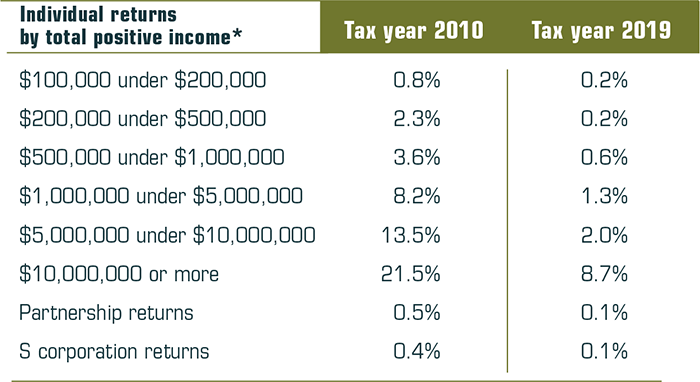
Small Businesses Should Prepare for Stronger Tax Enforcement
The Inflation Reduction Act of 2022 is providing the IRS with an influx of about $80 billion to modernize outdated technology and rebuild a depleted workforce, which is expected to improve enforcement to the tune of about $200 billion over a decade. Treasury Secretary Janet Yellen directed the agency not to use additional resources to increase audit rates for taxpayers making under $400,000 a year, but the tax returns of high-earning business owners are likely to face more scrutiny than they have in years past.1

Higher audit rates won’t appear overnight, but large investments to upgrade technology could eventually help the IRS develop more advanced enforcement methods. With that in mind, here are some tips to help you avoid unwanted attention from the IRS.
Understand the process. Tax returns are randomly selected, which means you might be audited even if you do everything by the book. However, when your tax return is processed, a computer program screens for anomalies and compares deductions to those of taxpayers with similar incomes. Your return is more likely to be chosen if there’s a higher chance that it would result in the collection of additional taxes, but an audit can also be triggered by a red flag on your return or a simple mistake that leads to additional questions. If selected for a correspondence audit, you may be asked to mail specific information to the IRS. A comprehensive field audit would be conducted at your home, place of business, or accountant’s office.
Avoid common traps. Filing an incomplete tax return (with missing forms or schedules) and not making tax payments on time are surefire ways to attract unwanted attention from the IRS. Taking business deductions that are not in line with industry norms, not categorizing transactions consistently from year to year, having a high number of independent contractors relative to full-time employees, and reporting continuous losses are all situations that can look suspicious, even if they are valid.
Audit Rates Over Time
IRS audit rates for individual, partnership, and S corporation income tax returns have fallen since 2010, a trend that could reverse as the IRS ramps up enforcement.
*Total positive income excludes losses
Source: Internal Revenue Service, 2022
Step up your record-keeping. Taxpayers are required to keep tax records for at least three years from the date the tax return was filed. Organizing and possibly digitizing your records could make it easier to respond to any requests for information that may come from the IRS — and not being able to provide a requested document could negatively impact your audit results.
A heightened focus on compliance means it may be more important than ever to consult an experienced tax professional for personalized guidance, especially if you receive any type of communication from the IRS.
This information is not intended as tax, legal, investment, or retirement advice or recommendations, and it may not be relied on for the purpose of avoiding any federal tax penalties. You are encouraged to seek guidance from an independent tax or legal professional. The content is derived from sources believed to be accurate. Neither the information presented nor any opinion expressed constitutes a solicitation for the purchase or sale of any security. This material was written and prepared by Broadridge Advisor Solutions. © 2023 Broadridge Financial Solutions, Inc.
Rudy Rodriguez is insurance licensed in the states of GA and FL. Stuart Jones is insurance licensed in the states of AL, FL, GA, IL, MD, MS, NY, SD, TN, TX and VA. Kinship Wealth Partners offers advisory Services through EPG Wealth Management LLC, an SEC Registered Investment Adviser. Securities offered through Arkadios Capital, a broker/dealer, Member FINRA/SIPC. Kinship Wealth Partners, EPG Wealth Management LLC, and Arkadios Capital are not affiliated through any ownership. Certain individuals associated with or employed by Kinship Wealth Partners, may be registered with EPG Wealth Management LLC and/or Arkadios Capital. Past performance does not guarantee or is indicative of future results. This summary of statistics, price, and quotes has been obtained from sources believed to be reliable but is not necessarily complete and cannot be guaranteed. All securities may lose value, may not be insured by any federal agency and are subject to availability and price changes. Market risk is a consideration if sold prior to maturity. Information and opinions herein are for general informational use only and subject to change without notice. This material does not constitute an offer to sell, solicitation of an offer to buy, recommendation to buy, or representation as the suitability or appropriateness of any security, financial product, or instrument, unless explicitly stated as such. Link to SIPC https://www.sipc.org/ Link to FINRA https://brokercheck.finra.org/ Privacy Policy SIPC FINRA ADV Brochure